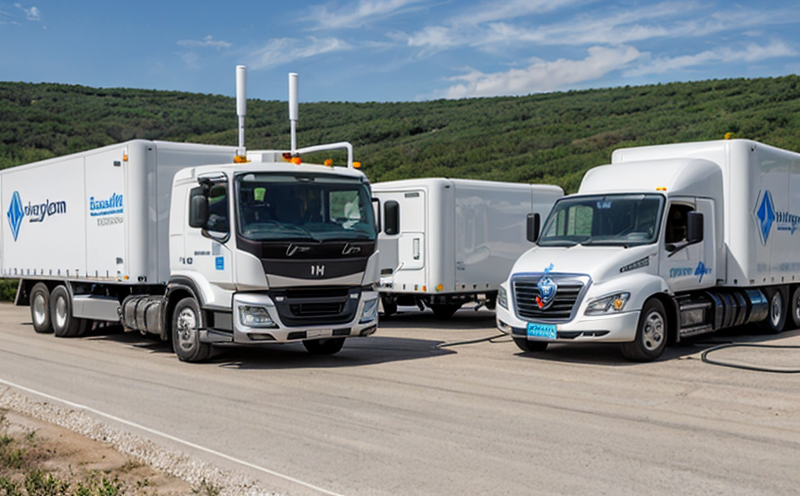IEC 62282-7-1 Hydrogen Fuel Cell Power Density Testing
The International Electrotechnical Commission (IEC) standard IEC 62282-7-1 is a pivotal document for the hydrogen fuel cell industry, providing detailed guidelines for testing and certifying hydrogen fuel cells. This service focuses on evaluating the power density of hydrogen fuel cells through rigorous testing procedures compliant with this standard.
Power density in hydrogen fuel cells refers to the amount of electrical energy produced per unit volume or weight of the fuel cell system. This metric is critical because it directly impacts the efficiency and practicality of hydrogen fuel cells as a power source for various applications, including transportation, stationary power generation, and portable electronics.
The IEC 62282-7-1 standard defines the methods to measure power density using an apparatus that includes a fuel cell stack, test bench, and appropriate instrumentation. The testing process involves operating the hydrogen fuel cell under controlled conditions, monitoring its electrical output, and comparing it against established benchmarks.
One of the key challenges in hydrogen fuel cell development is achieving optimal power density while maintaining durability and reliability. Our service ensures that each fuel cell undergoes thorough evaluation to meet these stringent requirements. By adhering strictly to IEC 62282-7-1, we provide accurate and reliable data that can be used for product improvement and regulatory compliance.
Our testing facility is equipped with state-of-the-art equipment capable of simulating real-world operating conditions. This includes temperature control systems, humidity management devices, and precise measurement tools. These capabilities ensure that the tests conducted are as close to actual use as possible, providing more accurate insights into the performance characteristics of hydrogen fuel cells.
In addition to measuring power density, our service also examines other critical parameters such as efficiency, durability, and safety features. Efficiency is measured by comparing the electrical output against the input hydrogen energy, while durability involves assessing how well the fuel cell withstands repeated cycles of operation and shutdown. Safety checks ensure that all components meet stringent safety standards set forth by international bodies.
The results from our IEC 62282-7-1 testing are comprehensive and detailed reports that include raw data along with interpretations based on industry best practices. These reports serve multiple purposes, ranging from internal quality control to external audits conducted by regulatory authorities or potential clients seeking assurance about the reliability of hydrogen fuel cell products.
By leveraging our expertise in hydrogen fuel cell testing aligned with IEC 62282-7-1, organizations can gain competitive advantage through better understanding and optimization of their product offerings. Whether you're a manufacturer looking to improve your current models or an innovator developing new technologies within this sector, our services offer invaluable support throughout the entire lifecycle of hydrogen fuel cell development.
Our team consists of highly qualified professionals who possess extensive experience in both academia and industry. They stay updated with the latest developments in hydrogen technology and continuously refine their methods to ensure accuracy and relevance. With us, customers receive not just test results but also valuable insights into potential improvements for future generations of hydrogen fuel cells.
Eurolab Advantages
At Eurolab, we pride ourselves on delivering exceptional services that go beyond mere compliance with standards like IEC 62282-7-1. Our advantages lie in our commitment to excellence, innovation, and customer satisfaction:
- State-of-the-art facilities: Equipped with cutting-edge technology for precise measurements.
- Expertise and experience: A team composed of experienced professionals who stay current on industry trends.
- Dedicated support: Personalized assistance from dedicated account managers throughout your project lifecycle.
- Comprehensive reporting: Detailed reports backed by raw data for informed decision-making.
Our advanced infrastructure supports not only IEC 62282-7-1 testing but also a wide range of other services relevant to the energy and renewable sectors. From prototype evaluation to full-scale production validation, Eurolab is your partner in ensuring high-quality products that meet global standards.
Customer Impact and Satisfaction
The impact of our IEC 62282-7-1 hydrogen fuel cell power density testing extends far beyond just meeting regulatory requirements; it plays a crucial role in enhancing the overall quality and performance of products within this sector. Here are some ways customers benefit from our services:
- Improved product reliability: By identifying potential issues early on, we help manufacturers enhance the longevity and dependability of their offerings.
- Innovation facilitation: Our detailed reports provide valuable feedback that can guide R&D efforts towards more efficient designs.
- Enhanced reputation: Compliance with recognized international standards enhances trust among stakeholders, including consumers, investors, and partners.
- Faster time-to-market: Efficient testing processes reduce delays associated with certification issues or rework needed due to non-compliance.
Satisfaction is a priority for us. We strive to ensure that every customer interaction is positive and productive. Our goal is to build long-term relationships based on mutual respect, transparency, and shared success.
Environmental and Sustainability Contributions
- Reduction in carbon footprint: By promoting the use of cleaner energy sources like hydrogen fuel cells, we contribute significantly towards lowering greenhouse gas emissions.
- Renewable resource utilization: Hydrogen fuel cell technology supports the efficient conversion of renewable resources into usable electricity.
- Eco-friendly operations: Our testing methodologies emphasize minimizing waste and optimizing energy consumption during laboratory procedures.
The commitment to environmental stewardship is embedded in everything we do at Eurolab. We recognize that sustainable practices are essential for creating a better future, not just today but for generations to come.





